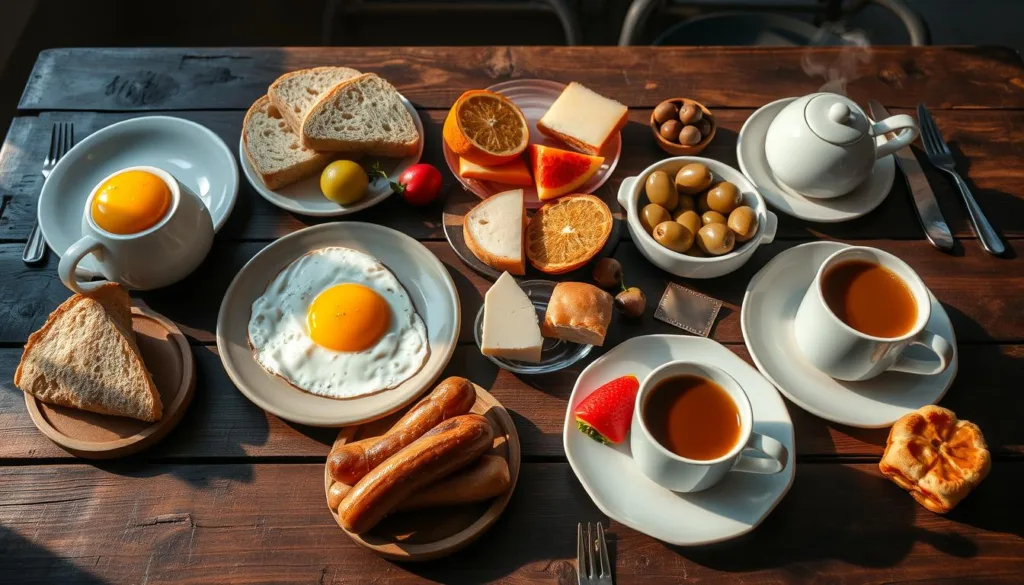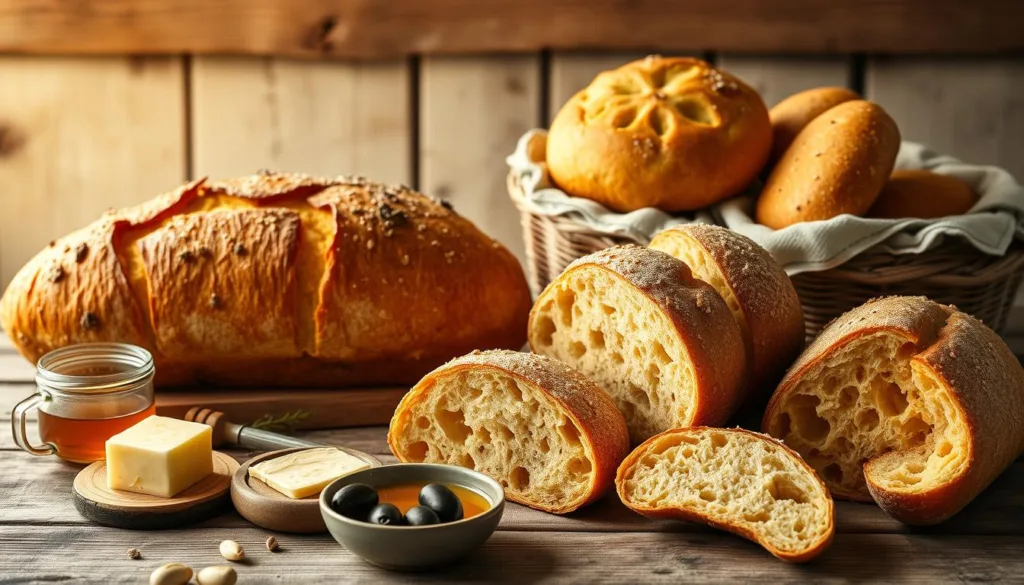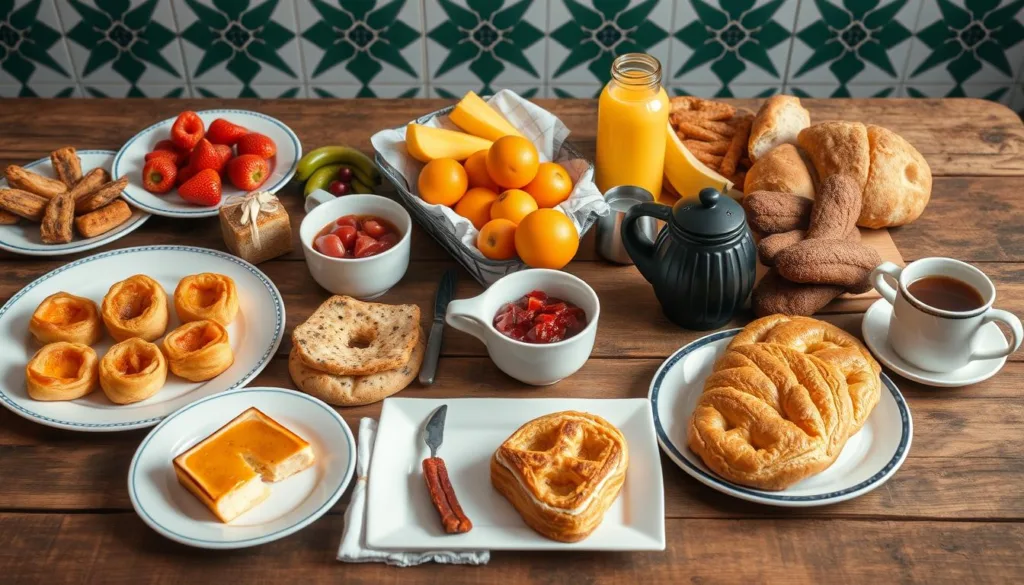Ever wondered about a traditional Portuguese breakfast? It’s simple yet satisfying. It shows the country’s rich flavors and traditions. Unlike big English or German breakfasts, it focuses on fresh bread, creamy cheese, savory ham, and milky coffee.
Enjoying a Portuguese breakfast is like exploring Portugal’s beautiful landscape.
The morning in Portugal is a celebration of simplicity. From sande mista sandwiches to pastel de nata, every item makes the day special. Let’s explore the flavors that make a Portuguese breakfast unforgettable!
Key Takeaways
- The Portuguese breakfast typically includes bread, cheese, ham, and milky coffee.
- Popular beverages consist of galão, meia de leite, and an abatanado coffee.
- Common breakfast breads include sandwiches and various types of toast.
- Pastries like pastel de nata are essential components of the morning meal.
- Locals often frequent traditional cafes for authentic breakfast experiences.
- Brunch is emerging but is not widely traditional among older generations in Portugal.
Table of Contents
Introduction to the Flavors of Portuguese Breakfast
Exploring portuguese breakfast shows a mix of tasty and simple foods. It’s a meal that brings people together. It’s all about fresh, seasonal foods, making every bite full of flavor.
In Portugal, breakfast often means different kinds of bread. You can have soft rolls or crusty baguettes. They’re great with butter, jam, or even ham and cheese.
Pastries like pastel de nata and travesseiros are also big hits. They make breakfast even more special.
Dairy products like yogurt, milk, and cheese are big in portuguese breakfast. Cereals and seeds add nutrition. Oatmeal is also getting popular for its health benefits.
Fruits are a big part of breakfast, showing off Portugal’s farming. They’re enjoyed with coffee, from espresso to galão. Together, they make a lively start to the day. Breakfast in Portugal is all about sharing and enjoying good food.
Typical Ingredients in a Traditional Portuguese Breakfast
A typical breakfast in Portugal is full of flavors and textures. Freshly baked bread is a big part, often with sweet or savory toppings. Toast, or torrada, is spread with butter and jams like fig and Port wine.
Sliced cheese, like Edam, and hams are also favorites. A mista sandwich with cheese and ham is common. Pastries, like Pastel de Nata, add sweetness.
Coffee is the drink of choice, enjoyed all day. Breakfasts include milky coffee like galão or meia de leite. Fresh orange juice adds a refreshing start to the day.
Children might have cereal or yogurt, showing a change in breakfast habits. But, the heart of traditional portuguese cuisine stays the same. Lunch is more important in Portugal.

Exploring Portuguese Coffee Culture
Portugal’s coffee culture is rich and varied. It offers many types of coffee drinks that show both local tastes and personal choices. Coffee is a big part of my day, linking me to the Portuguese breakfast.
Types of Portuguese Coffee Drinks
Portugal has many tasty coffee options. In local cafés, I often see:
- Café: A strong espresso with lots of flavor.
- Galão: Espresso mixed with warm milk for a creamy drink.
- Meia de leite: Half coffee, half milk for a gentle start.
- Café duplo: Two shots of espresso for a big caffeine boost.
- Café com cheirinho: Espresso with a hint of brandy for a unique taste.
- Café pingado: Espresso with a little milk for a smooth drink.
These drinks show the coffee culture in Portugal. They range from strong to light, meeting all tastes. Whether I want something bold or creamy, there’s a coffee for me.
The Role of Coffee in Daily Life
Coffee is key in my daily life. It wakes me up and brings people together. In Portugal, coffee is a must at breakfast.
The Lisbon café scene is famous and full of history. I enjoy old spots like Martinho da Arcada and new places like Copenhagen Coffee Lab. Each coffee is a mix of tradition and modernity, showing the Portuguese coffee culture in action.
| Coffee Type | Description |
|---|---|
| Café | Espresso, a bold choice for coffee lovers. |
| Galão | Espresso with plenty of warm milk, perfect for breakfast. |
| Meia de leite | A balanced blend of coffee and milk. |
| Café duplo | Double espresso for a serious caffeine kick. |
| Café com cheirinho | Espresso with a splash of brandy for added flavor. |
Every sip connects me to Portugal’s heart. It shows the country’s history and changing tastes. Coffee rituals energize mornings and build community, making them essential to my day.
Bread: The Heart of Portuguese Breakfast
Bread is very important in Portuguese breakfasts. It comes in many types, each with its own taste and texture. Local bakeries offer a wide range of breads, making breakfast fun and tasty.
Different Types of Portuguese Breads
Choosing the right bread for breakfast is easy in Portugal. Here are some favorites:
- Papo Seco: Small, crusty rolls often enjoyed fresh or toasted.
- Torrada: Thick slices of bread toasted and generously spread with salted butter.
- Pão de Mafra: A chewy bread with a crusty exterior, commonly seen at breakfast tables.
- Bolo do Caco: A unique flatbread from Madeira, often served warm with garlic butter.
- Broa de Milho: A hearty cornbread from the Minho region, perfect alongside savory meats.
How Bread is Served During Breakfast
At a traditional breakfast, bread is served in a simple yet tasty way. It’s often toasted and filled with cheese and ham. The Tosta Mista, a pressed sandwich, is a favorite. It combines ham and cheese in a delicious way.
The variety of toppings makes breakfast even better. Sweet jams and savory fillings share the plate. But the focus is on the savory. Bread is the main part of breakfast, starting the day off right.

Classic Portuguese Breakfast Components
Thinking of a traditional breakfast in Portugal makes me imagine tasty parts. Popular breakfast sandwiches are key, with flavors that excite. They’re in warm rolls or toasted, making mornings better.
Popular Breakfast Sandwiches
Breakfast sandwiches are big in Portugal. Favorites include:
- Sande de Queijo – A simple cheese sandwich with flamengo cheese.
- Sande Mista – A ham and cheese mix, with rich flavors.
- Tosta Mista – A cheesy melt with oregano, a twist on ham and cheese.
These sandwiches fill my belly and celebrate local food in tasty ways.
Commonly Used Cheeses and Hams
Cheeses and hams are big in Portuguese breakfasts. Flamengo cheese and sliced ham make a great pair. These ingredients show Portugal’s rich food tradition.
Using local ingredients makes breakfasts feel more real. It shows the true taste of the region.
Portuguese Pastries: Sweet Morning Treats
Portuguese pastries are a big hit for breakfast. They bring happiness and show off Portugal’s rich food history.
Pastel de Nata: The Iconic Custard Tart
The pastel de nata is Portugal’s star pastry. It’s found everywhere, with creamy custard in a flaky crust. Trying it outside Portugal just isn’t the same.
Enjoying a fresh pastel de nata with coffee is the real deal. It’s the heart of a traditional breakfast.
Other Notable Portuguese Pastries
My mornings also feature other tasty Portuguese pastries. For example:
- Bola de Berlim: This doughnut is filled with creamy custard.
- Bolo de Arroz: These muffins are made from rice flour and are savory.
- Pão de Deus: This roll is topped with coconut and has a sweet egg filling.
- Travesseiros de Sintra: These pastries are filled with almond cream and are very soft.
- Queijada Dona Amélia: These are sweet, made with honey and raisins.
Each pastry has its own taste and texture. They pair well with milky coffee, making breakfast even better. Portuguese pastries make mornings sweeter for everyone.

Morning Portuguese Meals: A Simple Yet Savory Affair
I love sweet pastries for breakfast. But savory options show the true taste of Portuguese food. They offer a mix of flavors and textures.
Savory Options for Breakfast
Bacalhau à Brás is a favorite. It’s made with cod, eggs, and potatoes. Farinheira com ovos mexidos is another great choice. It mixes sausage with scrambled eggs.
Amêijoas à Bulhão Pato is also good for breakfast. It’s a twist on a dish usually eaten at lunch or dinner.
- Bacalhau à Brás: A classic comfort food rich in flavor.
- Farinheira com Ovos Mexidos: Perfectly combines savory sausage and eggs.
- Amêijoas à Bulhão Pato: Steamed clams offer a coastal delight.
- Empadas: These savory pies bring a world of flavors in every bite.
Using Seasonal Ingredients
Using seasonal ingredients makes meals better. It also celebrates local harvests. Fresh fruits and veggies add color and taste to dishes.
This makes breakfasts change with the seasons. It highlights local foods and supports local farmers.
| Season | Fruits | Vegetables |
|---|---|---|
| Spring | Strawberries | Asparagus |
| Summer | Peaches | Tomatoes |
| Fall | Pears | Pumpkins |
| Winter | Citrus Fruits | Root Vegetables |
Regional Variations in Portuguese Breakfast
Traditional Portuguese cuisine is full of regional flavors. Each area has its own special ingredients and cooking ways. In Alentejo, breakfasts are big, with bread and cured meats. They give you a strong start to the day.
In Lisbon, you’ll find many pastries. It’s light but tasty, with about 300 calories per 100 grams.
Porto has a different feel, with big breakfasts and seafood. Each place adds its own twist to breakfast, showing how diverse Portuguese breakfasts are.
Now, local spins on old favorites are getting popular. You can try different Rabanadas in each place. Tosta Mista with Queijo de Azeitão cheese is another favorite. And don’t miss the Bola de Berlim, filled with custard cream or Nutella.
| Region | Specialties | Notable Item Calories |
|---|---|---|
| Alentejo | Rich bread, cured meats | N/A |
| Lisbon | Pastries, pastel de nata | 300 calories |
| Porto | Seafood dishes | N/A |

Exploring regional breakfasts in Portugal shows the variety and culture behind them. Each dish has its own story, celebrating local ingredients and traditions.
Brunch vs. Breakfast in Portugal
In Portugal, breakfast and brunch are different. This shows a special brunch culture that’s popular among young people in cities like Lisbon. Breakfast is early, from 8 a.m. to 9 a.m. It includes simple foods like a toast or sandwiches.
Brunch in Portugal is more exciting. It mixes breakfast favorites with new tastes. You might find pastries, avocado toast, and fancy egg dishes. This makes brunch unique compared to breakfast.
To show the difference, here’s a table comparing breakfast and brunch:
| Category | Breakfast | Brunch |
|---|---|---|
| Typical Time | 8 a.m. – 9 a.m. | 10 a.m. – 2 p.m. |
| Common Beverages | Coffee (Galão, Meia de Leite), sweetened chocolate milk | Mimosas, flavored coffees, specialty teas |
| Popular Items | Uma torrada, ham and cheese sandwiches | Avocado toast, gourmet pastries, brunch cocktails |
| Dining Atmosphere | Quick and casual | Relaxed and social |
Brunch is becoming a place for friends and family to meet. It’s not just a quick meal. The growing brunch culture in Portugal might make brunch a favorite tradition. It’s a mix of breakfast and lunch that’s fun and tasty.
What Time Do Portuguese People Have Breakfast?
In Portugal, people usually eat breakfast from 8 a.m. to 9 a.m.. This meal starts their day. Many love this morning routine. Cafés and pastelarias open at 8 a.m. They offer food and drinks for early birds.
Traditional breakfasts have many tasty items. People often have coffee, custard tarts, and butter toast called torrada. Some like ham and cheese toast or rich coffee like galão, meia de leite, and abatanado.
Children might choose different cereals. Young adults prefer yogurts and fruit. Pastries like Pastel de Nata, Pão de Deus, and others are also popular. Breakfast in Portugal is a tasty adventure.
For a mid-morning snack, the lanche da manhã happens from 10 a.m. to 11 a.m. It’s often with coffee and sweet treats like pastel de nata or bolo de arroz. This snack keeps food a big part of daily life in Portugal.

Where to Try Authentic Portuguese Breakfast
Looking for a real Portuguese breakfast is fun. Traditional cafes, or pastelarias, are everywhere. They offer a great place to start your day with true Portuguese tastes. Here are some top spots for a breakfast you’ll remember.
- Brunch Café: Open daily from 8:00 am to 9:00 am, making it an ideal spot for early risers.
- Zenith: This café welcomes guests Monday to Friday from 8:00 am to 5:00 pm and Saturday to Sunday from 8:00 am to 6:00 pm.
- Breakfast Lovers Misericórdia: They serve breakfast Monday to Friday from 8:00 am to 4:00 pm and on weekends from 8:00 am to 5:00 pm.
- Rhodo Bagels: A great place for a cozy breakfast, with hours from Wednesday to Sunday from 9:00 am to 4:00 pm.
- Audrey’s: Conveniently open every day from 7:30 am to 11:00 pm, perfect for late breakfasts.
- Seventh Brunch Chiado: Open every day from 8:00 am to 4:00 pm, with a twist on traditional dishes.
- Fábrica da Nata: A must-visit for those who love the pastel de nata, open daily from 8:00 am to 11:00 pm.
When you’re out looking for where to eat, try the *torrada* with meats. Or, enjoy a *galão*, a favorite coffee. Each café adds its own twist to these classics. So, every visit is unique. Whether in a big city or a small town, a Portuguese breakfast is a must-try.
Making Traditional Portuguese Breakfast at Home
Making breakfast at home can be fun. It lets us enjoy the real taste of Portuguese food. We can use popular recipes and local ingredients to feel like we’re in Portugal.
Portuguese egg dishes like scrambled or fried eggs make mornings special. They show off the culture of Portugal.
Popular Recipes to Try
There are many dishes that show the beauty of a Portuguese breakfast. Here are some recipes I love:
- Pastel de Nata – These creamy custard tarts are a sweet delight.
- Rabanadas – Portuguese-style French toast is great for weekend mornings.
- Portuguese Breakfast Pizza – A fun mix of scrambled eggs, cheese, and chourico on pizza dough.
For the pizza, using good ingredients makes a big difference. You’ll need 1 pound of pizza dough, 4 large eggs, and 1 cup of shredded Cheddar cheese. Preheat the oven to 425 degrees F and cook for 18-20 minutes.
Tips for an Authentic Experience
To make breakfast feel real, pay attention to the little things. Here are some tips:
- Choose the best ingredients like fresh bread, local cheeses, and good coffee.
- Try traditional sandwich fillings like ham and cheese or “Romeu e Julieta” with sweet quince jam and salty cheese.
- Add liquid yogurts and different fruit preserves to make it complete.
Understanding the true taste of a Portuguese breakfast brings joy. It also respects the culture it comes from. With these recipes and tips, you can celebrate this special part of traditional cuisine.

| Ingredient | Quantity | Nutritional Value (per serving) |
|---|---|---|
| Pizza Dough | 1 pound | Varies |
| Large Eggs | 4 | 13g protein |
| Shredded Cheddar Cheese | 1 cup | 16g fat |
| Diced Chourico | 4 ounces | Varies |
| Sodium | N/A | 719mg |
| Fiber | N/A | 3g |
| Calcium | N/A | 139mg |
Health Considerations of a Portuguese Breakfast
Having a traditional breakfast in Portugal has its health points to think about. These meals are often rich and can have lots of calories. It’s good to watch how much you eat, even if you love pastries and bread.
To make breakfast better, I mix old favorites with new, healthy foods. Adding fresh fruits or juice can make it tastier and healthier. The Mediterranean way of cooking in Portugal uses olive oil, herbs, and veggies, which are good for you.
Let’s look at some common breakfast foods in Portugal and their healthier options:
| Breakfast Component | Calories | Healthier Alternative | Calories |
|---|---|---|---|
| Pastel de Nata | 225 | Fresh Fruit Salad | 100 |
| Buttered Toast | 150 | Whole Grain Toast with Avocado | 130 |
| Chouriço (Portuguese Sausage) | 300 | Scrambled Eggs with Spinach | 200 |
| Sweetened Yogurt | 180 | Plain Greek Yogurt with Honey | 150 |
When I think about a Portuguese breakfast, I see the need for balance. Mixing healthy foods with favorites is a smart way to start the day. Knowing what to eat helps me enjoy Portuguese flavors while staying healthy.
Cultural Significance of Breakfast in Portugal
Breakfast in Portugal is more than just food. It’s a time for families and friends to come together. Sharing breakfast creates a warm and cozy atmosphere.

Unlike many places, breakfast in Portugal doesn’t have bacon and eggs. Instead, it’s filled with tasty pastries, cheeses, and fresh bread. This shows off Portugal’s unique tastes and traditions.
Pastries are a big deal, with the famous Pastel de Nata being a top choice. This custard tart has been around for over a century. It shows Portugal’s love for pastry making.
Family-run pastelerias are everywhere during breakfast. They add to the lively feel of the morning. This shows how important breakfast is in Portugal.
Rabanadas, a Portuguese version of French toast, is a holiday favorite. It brings joy and connects people to their culinary roots. Queijo de Azeitão, a top cheese, is also a big part of breakfast. It shows off Portugal’s rich flavors and farming traditions.
Breakfast in Portugal is more than just eating. It’s about warmth, connection, and delicious flavors. Every bite tells a story of togetherness and community.
Conclusion
Thinking about traditional Portuguese breakfast makes me happy. It’s simple, tasty, and full of culture. Each part, like the bread and Pastéis de Nata, shows Portugal’s love for food.
Breakfast in Portugal is more than just eating. It brings people together. Enjoying a *cimbalino* or *bacalhau* dish feels like celebrating life. It’s a special way to experience Portugal’s heritage.
Sharing these breakfast treats with others is fun. It lets me share Portugal’s culture with friends and family. Exploring these *morning favorites* is an adventure I want everyone to try.
FAQ
What are the typical components of a Portuguese breakfast?
How does Portuguese coffee culture influence breakfast?
Are there any specific breakfast sandwiches I should try?
What is pastel de nata and when is it typically enjoyed?
How do Portuguese breakfasts vary by region?
Can I recreate a Portuguese breakfast at home?
What health considerations should I keep in mind for a Portuguese breakfast?
What makes breakfast a significant meal in Portuguese culture?
If you liked this article, you might also like :
- Low Carb Breakfast Recipes from our Breakfast category.
- Nacho Trays from our Lunch category.
- Fajitas de Pollo from our Dinner category.
Follow us on Facebook, Instagram, Pinterest, X and Youtube for the latest news, tips, and exclusive content.

